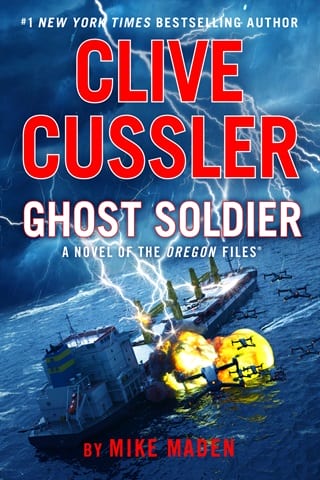Chapter 15
15
The Yellow Sea
Captain Pak’s wary eyes were glued to the periscope, its Chinese glass clear and bright. He felt a surge of adrenaline course through his veins as he tracked the South Korean destroyer knifing through the water and growing larger by the minute. The King Jeongjo the Great was the bandit nation’s latest and most powerful ship, manufactured in Ulsan, Hyundai Heavy Industries’ shipyard.
A lusty urge rose up in him, like a hunter drawing a bead on a prized stag bolting through the forest. He shuddered with the thrill of the coming kill.
Pak’s submarine was a twenty-seven-year-old Romeo-class diesel-electric boat. It had been built in a North Korean shipyard, a copy of a Chinese variant of a 1950s Soviet design. Despite its age, his boat was in excellent working order and the pride of North Korea’s submarine fleet. Its primary advantage was its range and relative quiet.
Thanks to superior Chinese battery technology, Pak had no need to fire up his diesel engines in the last four days, and he also put his boat in ultra-quiet condition. This enabled him to lurk in absolute silence in his target’s known patrol lane and wait for his quarry to come to him. His hunter’s patience had finally paid off when his passive sonar detectors picked up the noise of the destroyer’s high-speed, twin-shafted prop wash.
North Korea’s navy had never received its due respect despite the fact it was the third largest in the world, deploying more ships than even the vaunted fleets of the imperialist Americans. What Pak’s navy lacked in technological prowess was more than made up for in revolutionary zeal, self-sacrifice, and devotion to Juche.
As powerful as these national attributes were, even the Respected Comrade Supreme Commander of the nation understood the advantages that technology conferred in the modern battle space. North Korea’s acquisition of the modified Khishchnik torpedo from the Vendor was about to change the strategic equation in the waters of East Asia and perhaps even the world.
According to the admiral, the modified Khishchnik far surpassed the abilities of the infamous Shkval, the world’s first operational supercavitating torpedo. By creating its own encapsulating bubble of air, a supercavitating torpedo was no longer subject to the drag and friction of water, allowing it to attain exponentially higher speeds than conventional torpedoes.
Incredibly, the modified Khishchnik was capable of mind-shattering speeds and its new fuel system extended its range to over one hundred miles. As the admiral explained, this made the Khishchnik the functional equivalent of a hypersonic underwater missile.
Pak’s heart nearly burst with excitement as he thought of the honor bestowed upon him. His submarine carried one of the newly acquired Khishchniks. Today, the South Korean Navy would be exposed as an impotent dog and its craven master, the cowardly Americans, as a toothless wolf.
It was time to put his finger on the trigger. But he knew he must be patient lest he startle his sensitive quarry.
★Captain Cho stood on the bridgewing of the King Jeongjo the Great, the pride of South Korea’s fleet, smoking a cigarette. The air battered his silver-flecked hair beneath his cap as his eyes fell on the far horizon. A churning slate-gray sky crashed into the frothing wine-dark sea. He smiled at his good fortune.
Long a commercial shipbuilding power, South Korea had entered the ranks of the great seafaring nations with the construction of this world-class destroyer, larger and more deadly than anything else of its type. Bristling with the latest weapons and linked to the omniscient six-megawatt radar of the Aegis Combat System, Cho’s vessel could sink or destroy almost any ship or aircraft within a hundred miles.
The King Jeongjo was the next step in his nation’s long march toward independence from American security promises. His nation was grateful for America’s decades-long defense of South Korea. But it was clear China’s rapid rise and America’s overextended global commitments meant his nation had to shoulder more of the burden for its own defense on land, in the air, and particularly at sea.
The crazed North Korean fanatics were merely an armed extension of China’s hegemonic ambitions. Their fleet of ships, though numerous, were generations behind in combat technologies. Most North Korean submarines were little more than refurbished Soviet-era subs, more fit for the scrapyards than modern combat. It was the aging fleet of North Korea’s “boomer” subs and their nuclear missiles that still posed the greatest threat. Modern vessels like King Jeongjo the Great were his nation’s mighty shield against the North Korean submarine terror.
Cho brought his binoculars to his blearing eyes, dried out by the whistling wind singing in the rigging above. Fleet headquarters had informed all patrol ships to be particularly vigilant. Reports of both Chinese aggression against American vessels farther south and of North Korean provocations along the DMZ had put everyone on edge. But so far Cho had encountered nothing of any concern.
“Captain!”
Cho turned around. His tactical operations officer, a lieutenant, stood in the bridge doorway.
“CIC reports possible sonar contact.”
 Fullepub
Fullepub 



